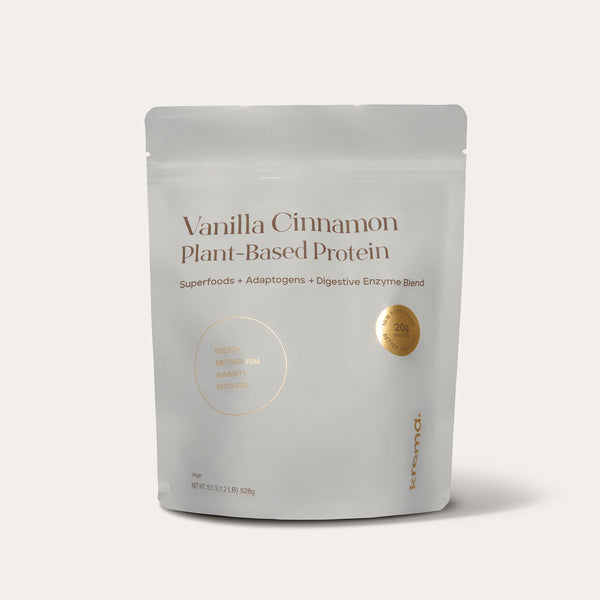Have you been on a journey to better health for a while now? Have you hit a healing block and are not sure where to turn? You may want to learn more about the Ayurvedic diet.
Usually, when we think of the word “diet” we think of the food we eat. In Ayurveda, it is so much more than that. It's a lifestyle that creates balance in your life, helping you to maximize health and wellness and heal with the power of food, exercise, and mindfulness.
What Is Ayurveda?
Translated to mean the “science of life,” Ayurveda, one of the oldest medical ideologies, is a holistic approach to health incorporating the importance of the body, mind, spirit, and environment in obtaining optimal health. It is believed that disease is due to imbalance or stress in the consciousness.
The Ayurvedic approach is focused on prevention by eliminating impurities, soothing symptoms, reducing worries, and increasing harmony in your life. Herbs, plants, essential oils, and common spices are used to prevent and treat ailments, along with diet, lifestyle, and exercise.
What Are the Benefits of Ayurveda?
By creating a healthy lifestyle, Ayurveda can help support the overall health of your body and mind.
Helps Reduce Inflammation
While there are a lot of personalized plans within Ayurveda depending on your dosha, a well-balanced diet is at the forefront of the Ayurvedic diet. Focusing on whole foods, you would limit refined sugars, refined grains, processed foods, and fatty, fried foods.
Excess inflammation can be caused by many culprits, but a poor diet is at the top of the list. By following the basic principles of an Ayurvedic diet, you can help reduce inflammation in the body.
Helps Reduce Stress
Ayurveda is more than just a diet, it is a lifestyle. It incorporates your body, mind, spirit, and the environment around you. There is a universal connectedness respected in Ayurveda.
The role of stress in disease has been well understood in Ayurveda for thousands of years. Stress is unavoidable, but there are practices we can put in place to help us deal with everyday stressors.
Yoga is very powerful in reducing stress. It combines two stress-reducing activities — exercise and mindfulness — into one practice. Mindfulness is being aware of thoughts and feelings inside your body and not assigning them meaning or judgment.
Another way you can reduce stress is self-care. Self-care comes in all shapes and sizes. This can be anything from taking a warm bath, fostering positive relationships, sitting in nature, or reading a book. Any activity that brings you joy can be self-care.
Supports Preventative Care
In Ayurveda’s holistic approach, prevention is key. Eliminating impurities in your diet, practicing stress-reducing activities, and boosting a nourishing, whole-food diet are at the root of an Ayurvedic diet.
Supports Healthy Weight Maintenance
There are many reasons one can gain weight. Eating too much “unhealthy” food, like overly processed, fatty, and fried foods is usually the first thing you may think of when you’re planning the best routes to lose weight. Some lesser-known reasons why you may gain weight are lack of sleep, not relaxing, and sitting too long during the day. When following an Ayurvedic lifestyle, eating whole foods, getting exercise, and prioritizing sleep is foundational.
Helps Boost Energy
Eating nutrient-dense food is of course important to boosting energy, but when you eat may be just as important. In Ayurveda, lunch should be the biggest meal of the day. This is because your metabolism is at its peak during lunchtime hours. Your body is able to metabolize your food and use it to make energy throughout the rest of the day.
In Ayurveda, they also recognize the importance of listening to your body and not over- or under-doing what is best for that specific moment. Sometimes exercise may be a full-on high-impact workout, and sometimes you may need to take it a little easier and do some stretching or yoga. Either way, the benefits to your energy will be noticed.
Oftentimes there's a problem of not having enough energy because, as a society, we run and run, not taking time to rest between activities or remembering the importance of joy in our lives. It is important to take some time for self-reflection and decide if your life is on overdrive and you need to take a step back and learn the power of no. In Ayurveda, this concept is an important one but often the hardest to implement.
What Are the Three Doshas?
According to Ayurveda, there are five elements of the world: Aakash (space), Jala (water), Prithvi (earth), Teja (fire), and Vayu (air).
Doshas are physical and mental constitutions that are a combination of these elements. We are all made up of each of the three doshas: Vata, Pitta, and Kapha, but one or two of them are usually dominant in each of us, making us all unique.
Knowing and understanding your dominant dosha(s) can bring you balance, and give you tools on what to eat, how to exercise, and how to maintain balance in your life to maintain health.
There are many questionnaires online that can help you determine your dosha/s. There are also Ayurvedic specialists that can help you understand your dosha. These specialists can also assist you with making a plan to better balance your dosha through lifestyle changes.
Vata

With a combination of the elements air and space, Vata is described as cool, light, dry, rough, moving, and changing.
The season that most resembles vata is the fall, with its crisp, cool days, and rough, dry landscape. People with a dosha of Vata are usually energetic and creative but easily distracted.
If the Vata dosha is out of balance, it can cause anxiety, insomnia, restlessness, arthritis, and gas.
Routine, warming meals, and self-care, like baths and massages, are positive ways to keep Vata balanced.
Pitta

Pitta, a combination of the elements fire and water, is oily, sharp, hot, light, fiery, and liquid. The hot, humid days of summer most resemble Pitta.
People who are dominant in Pitta can be described as determined, intelligent, and ambitious; they love control and being the center of attention.
An imbalance within Pitta may cause acne, inflammation, acid reflux, loose stools, anger, and impatience.
Living a balanced life of rest and activity, gratitude, yoga, and enjoying nature are ways to keep a Pitta dosha well-balanced.
Kapha

Cold, moist, dull, heavy, dense, static, and soft are all words that describe Kapha. The slow awakening of hibernation in spring is a perfect metaphor for the kapha dosha.
People dominant in this dosha are strong, patient, grounded, stable, and supportive of their loved ones.
When out of balance they may suffer from weight gain, excess sleep, water retention, allergies, and fatigue.
To balance Kapha look to exercise, warmth, newness, and warm beverages, like warm lattes.
How Can I Determine My Doshic Imbalances?
You may be curious how to find out if your dosha is out of balance. To have a personal explanation of your imbalances, you can talk to an Ayurvedic doctor. In this visit, the doctor will review your overall physical health by looking at the coloring of your skin, eyes, and tongue, listening to your body, and asking you questions about your overall symptoms and mental health.
Without the help of an Ayurvedic doctor, you can get a pretty good understanding of where your imbalances lie by understanding the imbalanced signs of each dosha.
For Vata, it may be dry skin, anxiety, insomnia, or gas. A Pitta imbalance may show as hot flashes, acid reflux, and irritability. Kapha imbalances present themselves as weight gain, allergies, depression, and lethargy.
What Are the Tenets of an Ayurvedic Diet?
Understanding your dosha is an important start in the Ayurvedic diet, but beyond that, there are some basic tenets to keep in mind.
Eat for Your Imbalance

When you are out of balance, the first thing you can do is find out what is best to eat for your dosha. Each dosha has a specific list of foods that will regain balance:
- Vata: Vata is cold and dry, therefore, you would add in foods cooked and served hot. Broths, hot cereal, cooked fruits, and warm beverages are very balancing for vata.
- Pitta: Cooling foods like salads, vegetables, and sweet juicy fruits are an excellent way to cool the fire of Pitta.
- Kapha: The Kapha dosha tends to be heavy and moist, so foods that are dry and light are best for balancing Kapha. This can include drier meats like chicken or freshwater fish, raw fruits and veggies, or smaller, lightly cooked meals.
Stay Away from Cold Beverages

In Ayurveda digestion is very important. Digestion is of the element fire. By drinking cold beverages you can reduce this fire of digestion, which can lead to an imbalance. Sticking to warm or room-temperature beverages is better for maintaining the balance of fire in your body.
Cut Out Coffee

Coffee is more than just a drink in the morning to start your day. It can also have a direct impact on your energy levels and sleep by causing them to be out of balance. If you are out of balance in Vata or Pitta, you should eliminate coffee completely.
Because of Kapha’s lower energy levels, it is okay to drink one cup of coffee but never more. If there are no imbalances, one cup of coffee before 10 am is considered okay, but switching it out for something more nourishing like a turmeric and herb latte is an even better idea.
Choose Whole Foods

Before you even need to understand your own dosha, clean up your diet. Choosing whole foods like vegetables, fruits, whole grains, and lean meats is a must when balancing your body. Understanding your dosha and any imbalances can point you in a more specific direction of what whole foods you should be consuming.
Eat Mindfully

In Ayurveda, mindfulness is an important practice, including while you eat. Mindful eating encourages being present while eating, with no judgment. Being present while eating your meal can help you listen to your body and understand its cues as to what foods it needs and when it is full.
Let Lunch Be Your Biggest Meal

Your metabolism is at its best between the hours of 10 am to 2 pm. With this in mind, it is best to eat your biggest meal of the day during this time period. This can help your body fully digest your food before you lay down to sleep. This will also help you to maintain energy throughout the day.
Embrace Moderation: The 80/20 Rule
Ayurveda is all about balance. Without moderation, you cannot achieve balance. As with anything, too much of a good thing can end up not being beneficial. With this, embrace the 80/20 rule, meaning you follow the “rules” 80% of the time, and allow yourself wiggle room the other 20%. This practice allows for moderation within the Ayurvedic diet.
The Bottom Line

Ayurveda is a lifestyle. You can eat the healthiest diet possible and still be unwell because of too much stress, lack of exercise, poor work-life balance, or unrewarding social connections. It may seem overwhelming to have to change everything, but making slow mindful changes is key.
The Ayurveda diet is a lifestyle focusing on body, mind, spirit, and environment. Understanding your dosha can help you understand how to balance your body with food, exercise, and self-care.
At Kroma Wellness, we encourage a holistically healthy, nourishing lifestyle, which is why we offer a 5-Day Reset to help you shift your habits to a better place. By incorporating this easy way to kick-start new habits, you can focus on other areas of change to create balance in your life.















